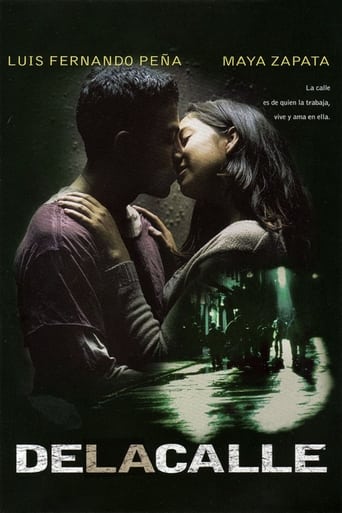

De la Calle is a moving film about the street kids of Mexico City. Through this film we see poverty, drug use and corruption. The main character, Rufino, begins with the film with the dream of leaving the horrors of street life in Mexico City, but gets blind sided with the idea of finding his real father. We see poverty and drug use through the street kids that live under the city. The corruption comes through strongly in the police involvement in the sale of drugs. This is exactly what gets Rufino in trouble, when he steals drug money to fulfill his dream of leaving the city. This film has a documentary feel, showing "real" street life in Mexico City, although it is a work of fiction. We see the chaotic life of living on the street in any city but what makes this film unique to Mexico City and Mexican culture is the fact that these street kids are a family. Rufino and his friends refer to each other as brothers. Xochitl, Rufino's girlfriend takes care of the younger street kids as a mother, even though she has a son of her own, that she is kept from her because she "can't" take care of him. This idea of family is even stronger during Rufino's relentless search for his real father; many of his brothers ask him why, as to say we are your family. When Rufino is violated towards the end of the film and it is shown to the audience that his attacker is in fact is real father it just reiterates that his true family is with the street kids.
... View MoreIf someone were compiling films about poverty and despair in the Western Hemisphere, I would definitely recommend De la Calle. Two other films to include (which this one reminded me of) would be Cidade De Deus and The Harder They Come. As I recall, someone in all of these films is doomed from the start. In De la Calle, the lead character consistently makes phenomenally bad decisions, leaving his girlfriend, whose instincts are relatively good, to suffer the consequences. It would have been nice if they actually did go to the ocean; the fresh air would have done them good, and the resulting film would have been just as engaging and probably more enjoyable.
... View MoreAs a first-time reviewer, I'll do my best: This movie gently warmed my heart, then tore it out. Almost documentary in style and realism, I was lost immediately in the story. Reminiscent of "Amores Perros," and, more distantly, of "Y Tu Mama, Tambien," this is a tale of forgotten vagabonds in Mexico City, their loves and hopes and desperate acts. Although fictional, you know these lives exist, and that realization is almost too horrible to comprehend. I cried. Don't let this deter you, though. Wait until you're in a pensive mood, then watch. Hopefully you'll be a better person after. True art.
... View MoreThis is a film set in present day Mexico City, where the teen aged main characters have little to live for except maybe drugs and sex. The main character is named Rufino, who learns that his father might be alive, and even though he had always been told otherwise, he becomes obsessed with finding him. Near the beginning of the film he comes into some drug money that shouldn't really be his, so he tells his girlfriend Xóchitl that she, her son, and Rufino can get away from the city, perhaps to see the ocean for the first time.But no one in this film really goes anywhere. The Ferris Wheel that they ride near the beginning of the film is the perfect image, since it goes around and around, but there is no real escape. Everyone is just getting by, living day to day.The acting by Maya Zapata (Xóchitl) and Luis Fernando Peña (Rufino) is excellent, and the rest of the young cast is also very natural. The camera is mostly handheld and the feel is very realistic and gritty.The first time director was not at the screening where I saw this at the San Francisco International Film Festival on 4/24/2002, but the SFFS person did read some comments from him, which included the words "open wound." I think that sums up the film, which is worth seeing but is certainly not uplifting.
... View More